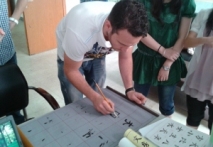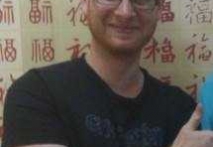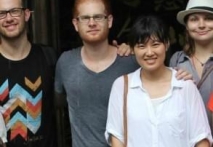Latest News
- Wuxi's Nanchang Street--a historic cultural district that combines classical charm, delicious food, and fun activities
- chinese study
- lastest courses
- Business Assistance/International Consortium of Stem Cell Research
- Foreigner's view of Jiangsu -Changzhou Jintan starts
- estimonials for Our new French Internship student Anais 企业表扬信
- The Double Seventh Festival in China Introduction
- Chinese Proficiency Test (HSK)
- China University Mining and Technology
- Wuxi Library
Students Say
Mandarin Student Zack
Mandarin Education School is a great place to learn Chinese and Chinese Culture.I've learned a lot in this school, my Chine...
Learn Chinese Travel China
If you want to learn Chinese and also discover China, Mandarin Education organize the most funny and cultural study tour.
The...
suzhou Mandarin Jude
I am Jude, I am learning Mandarin in Suzhou Mandarin School,I was learning in Wuxi Mandarin Education too.I like my Chinse Teacher...
chinese class
Improve your reading, speaking and your writing by experiencing our teaching methods,Offer free student Visa.
...
Wuxi Mandarin Jessie
I've learned Chinese for almost 8 years, I can understand what Chinese people say,but when I speak, I feel very uncomfor...
Chinese Internship or Jobs
You are looking for a professional experience abroad? Get the opportunity to discover the Chinese business,Look for an ...
Mandarinedu Student Florent
I love my Wuxi Mandarin Education School. It is the EASY MANDARIN Learning way, I am learning faster than I wanted.My teach...
Mandarin E Learning
Mandarin Education School offers you Online Chinese Courses. It has never been so easier to have Chinese courses ...
Mandarin Student Brad
I am studying Chinese in Mandarin Education School. I can speak quit good Chinese and talk to Chinese people by myself. Thank...
Wuxi Mandarin edu. Student Jennifer
I love learning Chinese in Mandarin Education School.That's a great place to learn and make friends.
...
Add Our School Official
to get more informations

0086 1866 1199 988
0086 510-81151808
Sandy.Swun
519988808
Mandarin Education School
Room 405, 4 Fl,Building No.8,
Maoye Business Center,
Chang jiang No.1,
New district , Wuxi City , China
On the Character 神 (Shén)
The notion of a Thunder God is a familiar figure in popular culture—People magazine's sexiest man alive in 2014, actor Chris Hemsworth,springs to mind, wielding the sacred hammer mjolnir to defend New York and London against alien invasions as he declares his undying love for the beautiful Natalie Portman in recent Marvel blockbusters. This Norse-inspired hero represents a well-known cultural trope, but it is perhaps less well-known that the ancient Chinese had a similar way of looking at their deities, so much so that the earliest Chinese character for "god" comes in the form of lightning. It occurred during the Shang Dynasty (1600 BCE – 1046 BCE) when the concept of god was written down as a swirl of lightning on oracle bones. The modern equivalent of the pictogram is 申 (shēn). Later, the radical 示(shì), indicating worship, was added to the left side. 示 was also a pictogram in the form of an altar on which the sacrifice was presented. With that, the character is complete: 神 (shén), the mysterious, all-powerful deity.
According to Chinese folk religion everything is governed by a god: the god of wind, or 风神 (fēngshén); the god of thunder, or 雷神 (léishén); and the god of sun, or 太阳神 (tàiyáng shén). Those are just some of the gods of the sky. When you look down to the earth, there are the mountain gods, or 山神 (shānshén); the sea gods, or 海神 (hǎishén); and the river gods, 河神 (héshén). Even in the modest household of the common man, there's the door god, or 门神 (ménshén), and stove god, or 灶神 (zàoshén), whose duties are to ward off evil and to record the deeds of the family. Of course, practical as the Chinese people are, their most worshiped deity is probably the god of wealth, or 财神 (cáishén). He is often represented as a gentleman with a red silk robe with golden embroidery who smiles and holds a jade scepter named ruyi in his right hand, with a gold sycee (a traditional ingot) on the left, the god of wealth can be found anywhere there's business to be done.
神 can also be used to describe genius and great talent. In the past, people used to refer to a doctor with great medical skills as 神医 (shényī), a particularly smart kid is called 神童 (shéntóng), and a crack shot is 神枪手 (shénqiāngshǒu). 神 goes on to mean "magical and amazing" and forms a series of words and phrases. For instance, 神通广大 (shén tōng guǎng dà) means "be infinitely resourceful", as in 他打探起小道消息来,真是神通广大 (tā dǎtàn qǐ xiǎodào xiāoxi lái, zhēnshi shén tōng guǎng dà), meaning, "He is infinitely resourceful at digging up gossip." 神乎其神 (shén hū qí shén) means "miraculous" but not without a satirical tone, as in 这种保健品被吹得神乎其神 (zhèzhǒng bǎojiànpǐn bèi chuīde shén hū qí shén, this dietary supplement ispraised to the heavens).
神 and 鬼 (guǐ, ghost) often go hand in hand to mean superpowers or the supernatural. 鬼使神差 (guǐ shǐ shén chāi), literally "manipulated by ghosts and gods", is used to describe surprising coincidences, unexpected events, or having done something inexplicable, as in 我鬼使神差地把盐加进了咖啡里 (wǒ guǐ shǐ shén chāi de bǎ yán jiā jìn le kāfēi lǐ). As if manipulated by the spirits, I added salt to my coffee). Another phrase, 鬼斧神 (guǐ fǔ shén gōng) literally means "ghosts' axes with god's technique" and is used to describe uncanny workmanship. The phrase 神出鬼没 (shén chū guǐ mò), literally "to appear like a god and disappear like a ghost", is often used to describe mysterious goings on. If something is conducted in secrecy, we use the phrase 神不知,鬼不觉 (shén bù zhī, guǐ bù jué), literally "unknown to god or ghost".
Chinese culture has never really been heavily religious, especially with the influence of Confucianism. Confucius told people "to respect ghosts and gods but also keep your distance" (敬鬼神而远之 jìng guǐ shén ér yuǎn zhī). In addition, there are a series of god/ghost combinations with negative connotations, such as 牛鬼蛇神 (niú guǐ shé shén), literally "ox ghosts and snake gods", which means "wicked people of all descriptions". Other phrases include 装神弄鬼 (zhuāng shén nòng guǐ, to disguise oneself as a ghost or a deity [to deceive people]) and 疑神疑鬼 (yí shén yí guǐ, be unreasonably suspicious).
Perhaps because the human mind is equally mysterious and elusive, 神 is also associated with mental and intellectual themes. For instance, 神智 (shénzhì) means "mind and intellect", while 神经 (shénjīng) is "nerve". From divine power to the complex human mind, 神 encompasses a wide range of subjects, all of which started with thunder and lightning from the heavens.










